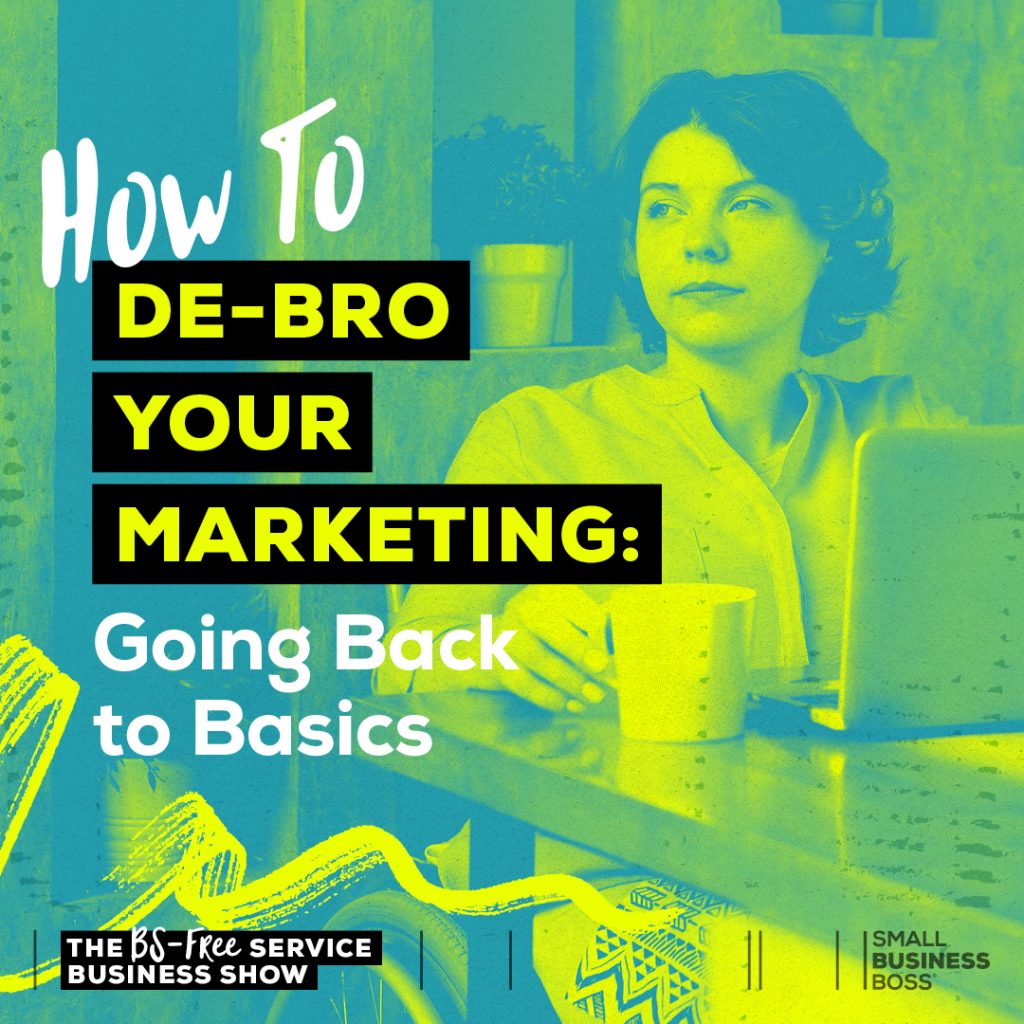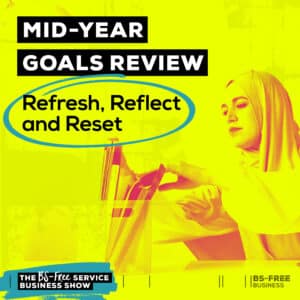
Search the site:
How to De-Bro Your Marketing: Going Back to Basics
The discussion of bro marketing is getting louder, but as we all know, talk is cheap. I’m more interested in how we get this approach to marketing out of our businesses, because if you work online, you’ve very likely have bro marketing baked into what you’re doing.
In this episode, I’m talking about how to de-bro your marketing, and you may be surprised at how simple this can really be.
Over the years, I’ve had the same conversation over and over again with my clients when it comes to their marketing.
They feel like they’re doing it wrong. Like they’re not doing enough. Or like they’re failing as they’re not magically attracting boatloads of clients.
My response is usually along the lines of, it’s not you, it’s how we’ve been taught to market our businesses. In online business, marketing has been twisted and turned into something that’s full of fear and manipulation. Frankly, many of these tactics aren’t even recognizable to me as someone who’s spent 20+ years in marketing and communications.
This, my friends, is the result of bro marketing. You know the hyper-hustle focused style of marketing that’s about getting people into your funnel no matter what. The kind of marketing that’s about being everywhere and turns you into a capital B brand. Marketing that strips away humanity and the relationships that should be at the heart of marketing.
The Bro Marketing Problem
Here’s the thing. Even if you’re not actively using these tactics taught by skeevy bros laying on a Ferrari, it’s likely had an impact on you. Especially if you’ve spent a hot minute in the online business world where these tactics are so commonplace we don’t even clock them.
Worse yet, the core tenets of this type of marketing makes us feel like we’re doing it wrong. That we’re failing if we’re not doing all the things or not getting massive results from our marketing.
And it’s important to know that bro culture has nothing do with gender and everything to do with a style of marketing that’s prevalent across this industry.
Case in point: a little something called client attraction.
On the surface, client attraction sounds great. I mean, who doesn’t want to attract clients?
The only problem is that this concept turns the process of finding clients into “magic” whereby we’re supposed to perform a series of actions that have clients showing up at our door.
It simplifies finding clients to such a point that it’s easy for us to think that if we have to work to find clients, we’re doing something wrong.
Newsflash: Finding clients requires ongoing, sustained, proactive effort. Even if you’re “attracting” them, there’s no magic.
As a content marketer, I know full well that this idea comes from the shift to digital tactics where it seemed like clients showed up magically through search or social media.
Client attraction is just a way of dressing up the work required to find clients, and anyone telling you that you can do it magically with one tactic is full of it. It turns what should be a proactive process into a passive one where we’re waiting for clients to show up, when there are so many things we could be doing instead.
But client attraction sounds a hell of a lot more compelling from a marketing point of view than trying out different tactics, tracking it, and figuring out what works for you.
Sure, there’s always a little bit of magic as to when clients show up and where they come from, but there’s also science involved. Look at where your clients actually come from, measure your marketing efforts and then focus on what really works for you.
Client attraction is just one example of how bro marketers have taken standard, real world marketing practices and twisted them into a snappy strategy that they can sell.
Just like with client attraction is that many of these strategies and tactics simply don’t work for many businesses.
What Are the Alternatives?
The discussion of bro marketing and its alternatives are having a moment in online business, which in my mind is long overdue. I started talking about bro marketing back in 2015, so I’ve been waiting for people to finally get that this approach to marketing isn’t necessary.
One of the big parts of that conversation is around what the alternatives are, and I’ve got good news for everyone.
The alternative to bro marketing is doing marketing how it’s done outside the online business world. In a way that’s based on proven practices that don’t rely on fear or layers of bullshit to get people’s attention.
Honestly, it’s that simple. Especially when that’s how I run my business, and the people I mentor do as well. They’re not using all these hyped up hacks in an effort to build their businesses.
And neither are my corporate clients. They’re doing marketing in a way that’s about building trust and relationships, with no shortcuts in sight.
So when people use the “not knowing the alternatives” excuse, I definitely roll my eyes. Digital marketing is NOT new. Many of the social media platforms have been around for over 10 years, email marketing for more than 20 years, and blogs since the mid-2000s.
There’s zero reason we can’t find alternatives. They’re right in front of our faces, and it’s up to us to de-bro our marketing.
Much of online business is based around fear, and for marketing, we’ve been taught we’re not good enough. So the “typical” way of marketing is built on being bigger, better, shinier and sparklier than we actually are, as that’s what we’ve been conditioned to think our potential clients and customers want.
Moving from Fear to Trust with Our Marketing
In the last episode I shared my TrustDNATM Method which is an approach to your business designed to put trust at the center of your marketing, sales and service.
As a refresher, TrustDNA is built on five cores: truth, transparency, time, results and respect. I’m going to walk through each of those cores with a look at how “typical” marketing is done in online business, and then explore what the alternatives are.
Truth
When it comes to online business, the truth can seem to be in short supply. It would seem like telling the truth would be easy, but in a world that demands a performance as part of your brand, it’s complicated.
I do think it’s worth pointing out here, that I don’t think everyone is necessarily bold face lying, but rather they’re so wrapped up in creating the facade or doing what it takes to succeed that they end up way off course.
A great example is the fake it until you make it mentality that’s so prevalent across the industry. There’s a major difference between claiming where you’re truly an authority and bullshitting your way through it so people buy your thing, and we need to know the difference.
There are so many ways this industry teaches people to fake it. But the biggest and most harmful one is the constant exaggeration when it comes to authority. Authority is invented out of thin air with experience and credentials exaggerated, or completely fabricated.
Want to be truthful in your marketing and your business? It’s time to cut the crap and drop the facade by leading with your authority. That means being in integrity and being honest about your expertise and qualifications.
If you’re just starting out, you may need to dig deeper to figure out what past experiences make you an expert. If you’ve been at this a while, you need to find the through line and figure out what you can really and truly own.
Because here’s the thing, when you’re embellishing or exaggerating, you’re setting yourself up for problems down the line. You’re creating trust in a way that will be broken when people figure you out.
That’s not to be alarmist, but rather to help us all tether ourselves to reality. In a world full of BS experts, being truthful will go a long way. You may be surprised at how far it can take you, and how with a little bit of focus you can figure out how to make it work for you.
Finally, remember this: if you’re an expert on everything, you’re an expert on nothing. To be an authority, you need to stay in your own lane and not be an expert on everything. Think carefully about what you do and don’t own when it comes to your business, because people hire subject matter experts and you want to be known for that thing.
The other part of telling the truth is being clear about your values. Here in 2021, people want to do business with people who share their values, and they want to know what to expect. Being shifty about what you do or don’t stand for doesn’t help you or your business, and it’s a fast track to destroying trust with your community and clients.
Transparency
Transparency is a little different than truth, as in an online world, we have a certain image or brand that we maintain. We’re taught that we’re brands above all else, and that can easily get off track.
What this doesn’t mean is that you have to share everything with everyone. Transparency is simply about “what you see is what you get”.
The fear that’s baked into bro marketing, and the online business status quo turns us into the best, curated versions of ourselves. And so many times that results in this weird amplified, embellished, shiny version of who we are.
A key place that I see a lack of transparency is with revenue claims. People talk about how much money they make in a way that’s designed to make us trust them. The only problem is that we’re not being provided all of the facts, so we’re being manipulated into trusting someone.
The alternative to this is that you don’t rely on revenue claims as a way to build trust at all. Your authority shouldn’t be predicated on how much money you do or don’t make. Or if you really want to talk revenue, provide context for the full story.
Storytelling is another area where transparency is often lacking. Stories are a powerful way to connect with people, but we’ve reached a point where stories are told for maximum dramatic impact and to short circuit us into trusting someone.
Think of the most common stories we hear (eg. the rags to riches story) and how if you look hard enough you’ll see that they’ve been curated to get our attention and create a connection.
Stories are powerful, but we need to move towards where we engage in responsible and respectful storytelling. We need to think carefully about the impact our stories have on our audience, and proceed with caution.
Plus, if we’re going to tell stories, we need to consider how we can do a better job of owning our privilege and sharing more facts about our backstory.
Time
When it comes to marketing, time is always a factor. I would be a very wealthy woman if I had $100 bucks for every single overnight success story I’ve read. Or every potential client that wants to game the system and get results faster.
Despite what the bros and fancy pants coaches selling you their systems tell you, there’s no fast track to success. Sure, some marketing methods will work better than others for your business, but time is always going to be a factor.
I think this rapid scale version of business success is one of the biggest marketing lies out there. From people saying they made 6-figures in a single launch to claiming things happened much faster than they did, it skews our expectations.
You know what else would make me a very wealthy woman? I also had $100 bucks for every corporate client I’ve told over the years to be patient with their marketing.
Marketing in the real-world requires time, and you know why? Because it takes time to build trust and to do that we need to focus on communicating realistic, supportive timeframes as part of our marketing.
What does that look like? For starters, it means being clear about how long things really take, whether that be your business journey or providing the space for people to get to know you.
Everyone wants marketing made easy and done in a way that moves people into trust quickly, but to build trust, you need to find a way to reduce urgency (or eliminate it completely) and more importantly, create simple and rewarding interactions that occur over time.
Think about your customer journey and how long it really takes for someone to go from discovering you to working with you.
The bro marketing fasttrack funnel approach is to get people to discover you and spend money within minutes, and then upgrade within days. This isn’t happening because of trust, if anything, it’s the result of these marketers eroding self-trust. While the sale gets made, no trust is created, and quickly things fall apart.
Instead of amping up fear, you can build trust by not pushing people to the next step, but allowing them to do it in a way that works for them. That will build way more trust and lead to lasting relationships with your clients.
Results
In marketing, testimonials are the way that we communicate potential results with our clients. We use them as a way to paint a picture of what it would look like to work with us.
There’s no denying that testimonials are an important part of social proof as it shows people that we can do what we say we’re going to do. But the real problem is that the status quo of online business is built on results not typical testimonials.
These are essentially the top 1% of results, and they don’t provide a complete picture. They set a misleading expectation that “if they did it, you can too”, as those results are only a fraction of the real experiences people are having.
Plus, I’m sure you’ve noticed that the majority of these testimonials focus on how much money was made as a way to communicate results.
Testimonials are a crucial part of our marketing, but we need to look beyond the top 1% and the results, not typical scenarios to provide a full picture of what it’s like to work with us.
If you have an outstanding testimonial that’s not typical, ensure you provide other testimonials that are closer to what people really experience. Look beyond the measure of money to other ways to measure results.
Finally, with your offers, when you talk about the potential results or benefits, take care to not overpromise. Using myself as an example, the one mastermind I run used to be called Double It, as the goal was for people to double their revenue within 12 months. Many people did double their revenue, but some did not, so I opted to rename the offer as I didn’t want to set an unrealistic expectation.
Respect
Of everything I’ve talked about in this episode, I feel like respect is the easiest, yet most often missing piece of the marketing puzzle in online business.
Let me tell you, the disrespect is so rampant, yet so subtle that it’s easy to miss. Or to decide that it’s just something you’re noticing.
It’s not you. The very way marketing is done in online business many times strips the humanity out of it in an effort to make the sale. (I’ll talk more about the sales part of this next week.)
Here are just a few examples of the lack of respect in marketing.
First, there’s the passive aggressive content and copy that sorts people into categories and reduces everything into an us versus them mentality. This is everything from social media posts that sort potential clients based on how much they’re willing to spend, to completely brutal “this is not for you if” sections on sales pages.
Then there’s the constant playing on the need to belong and alienating anyone who’s not part of that group. Not to mention how the need for diversity, equity and inclusion (DEI) is completely overlooked.
If you listen to this podcast I know you know this, but we’re people dealing with people. Our customers, our clients aren’t simply bank accounts, so we need to market accordingly.
Business is about relationships, and that means we need to approach our marketing with respect. Because without respect, there won’t ever be trust.
First, we can start with this simple truth: Even if someone isn’t paying you they deserve respect. I’ve seen way too many people using people not paying them as a punchline for their marketing, and it’s not okay.
My approach for this in my marketing is to be helpful and kind. This doesn’t mean I tolerate bullshit or have weak boundaries, but rather that I engage in my marketing in a way that puts respect at the core.
As for DEI, this for me is a work in progress. In my marketing it means ensuring that I’m being as inclusive as possible in my language, word choices, imagery and that even my social media presence is a brave, inclusive space. Most of all, it’s also ensuring that my marketing matches the rest of my business, so this is not just a performance designed to broaden my appeal.
Put Trust First in Your Marketing
Each of the trust cores that make up the TrustDNA Method offer a way to check-in on your marketing and create a new path forward. Remember, this is not meant to be a rigid checklist, but rather a way for you to think critically about how to clear bro marketing and the online business status quo out of your business for good.
By focusing on trust over fear in your marketing, you’re getting back to proven marketing basics that work in the real world. The way we’ve done things for so long in online business impacts all of us, even if we think we’re good, so look at how you can bake more trust into your marketing moving ahead.

I’m Maggie Patterson (she/her), and services businesses are my business.
I have 20+ years of experience with client services, am a consultant for agency owners, creatives, and consultants, and vocal advocate for humane business practices rooted in empathy, respect, and trust.
Read or Listen to the Latest
For Solo Business Owners

Growing a solo service business is tough.
It’s even harder when you’re bombarded with BS advice that steers you away from your values and why you started your business in the first place.
This is the podcast for solo creatives and consultants who want to remain as a team of one and have zero interest in the hustle and grind of typical business teachings.
Subscribe now and never miss an episode.
For Micro Agency Owners
Most podcasts for agency owners obsess over revenue growth as the ultimate success metric.

But here’s the truth: not everyone wants to make millions. Your goal might be to build a sustainable business that lets you have a life and doesn’t run you into the ground.
Join me as I spill my shameless confessions and share everything I’ve learned about building a micro agency that skips the BS of tired and typical agency teachings.
Follow Now on All Major Podcast Platforms








